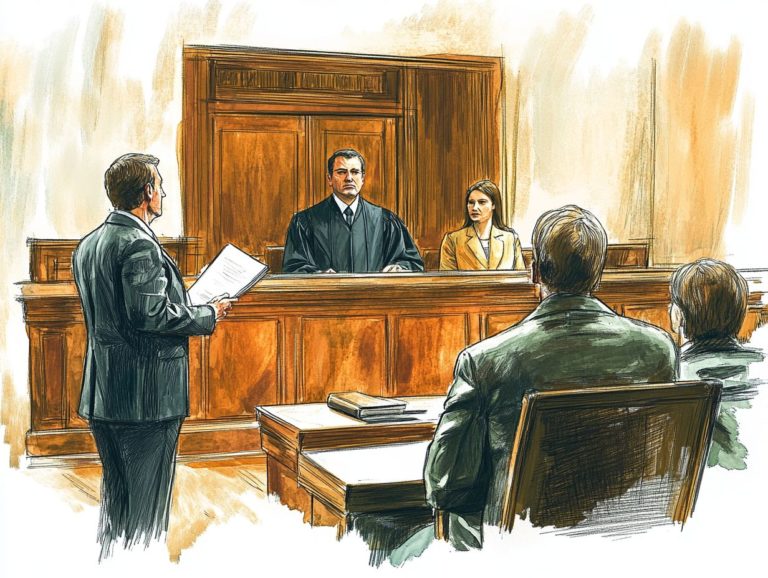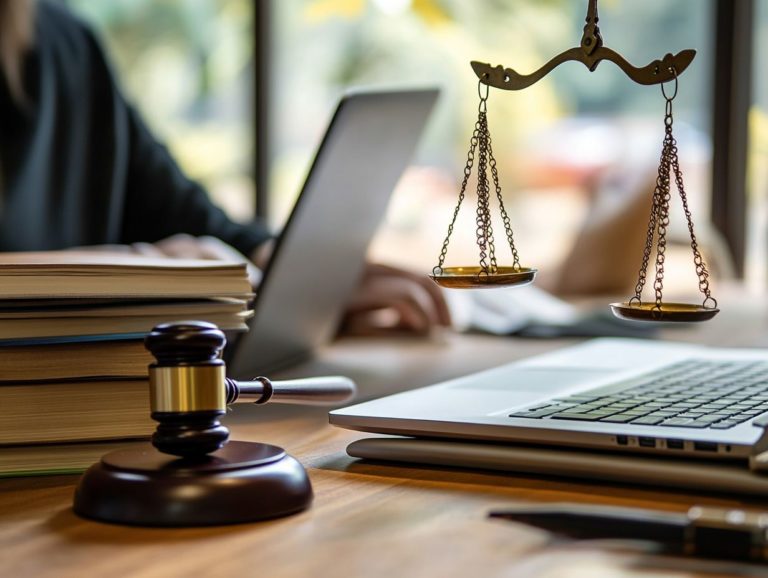What Makes an Effective Defense Strategy?
In an increasingly complex world, grasping defense strategy is essential for safeguarding your assets and ensuring resilience against potential threats. Get ready to explore these essential concepts and equip yourself with the knowledge needed for a robust defense.
This article delves into the core elements that form an effective defense strategy, guiding you from identifying vulnerabilities to developing a comprehensive plan.
Key factors to consider include assessing the threat landscape and wisely leveraging your available resources.
You ll also discover strategies for implementing and maintaining a defense approach that adapts to evolving challenges, ensuring sustained protection.
Contents
- Key Takeaways:
- Understanding Defense Strategy
- Key Elements of an Effective Defense Strategy
- Factors to Consider in Creating a Defense Strategy
- Implementing and Maintaining a Defense Strategy
- Preguntas Frecuentes
- Qu hace que una estrategia de defensa sea efectiva?
- Por qu es importante una estrategia de defensa efectiva?
- Cu les son los elementos clave de una estrategia de defensa efectiva?
- C mo juega un papel la evaluaci n de riesgos en una estrategia de defensa efectiva?
- C mo contribuye la planificaci n de contingencias a una estrategia de defensa efectiva?
- C mo pueden el entrenamiento y los simulacros regulares mejorar una estrategia de defensa efectiva?
Key Takeaways:

- An effective defense strategy protects you from threats.
- Regularly assess the threat landscape to stay prepared.
- Adapt your strategy as new challenges arise.
Understanding Defense Strategy
Understanding a defense strategy is crucial for navigating the intricate landscape of the criminal justice system. A well-structured defense strategy not only addresses criminal charges but also significantly influences the trial’s outcome.
Key elements such as creating reasonable doubt, jury selection, and understanding the obligation to prove your innocence are vital in crafting effective defense tactics. Criminal defense lawyers like John Fanney, based in Raleigh, North Carolina, utilize their expertise to employ a range of trial tactics, courtroom management techniques, and plea deal negotiations. This ensures that you receive the legal representation you deserve under the U.S. Constitution.
Defining the Concept
A defense strategy is your comprehensive game plan crafted by a lawyer defending your case to counter the prosecution s case and advocate for your legal rights, all while aiming to create reasonable doubt in the minds of jurors.
This strategy requires a thorough examination of the evidence, a deep understanding of legal precedents, and the ability to communicate effectively in court. Typically, it encompasses key elements such as:
- Gathering witness statements,
- Examining forensic analysis,
- Preparing cross-examination questions designed to spotlight weaknesses in the prosecution s arguments.
Crucially, a well-constructed defense strategy safeguards your legal rights and upholds the integrity of the judicial system. It ensures that every defendant has a fair opportunity to present their case and contest the charges brought against them.
Key Elements of an Effective Defense Strategy
An effective defense strategy relies on several critical components. You must focus on meticulous evidence presentation, strategically leverage witness testimony, and carefully craft jury instructions that align with the legal standard of reasonable doubt.
Each of these elements plays a vital role in steering toward a favorable trial outcome.
Identifying and Addressing Vulnerabilities

Identifying and addressing vulnerabilities in a case is a crucial responsibility for you as a defense attorney. It involves thoroughly analyzing the prosecution’s case for weaknesses think inconsistencies in witness testimony or potential allegations of police misconduct.
This level of scrutiny requires you to dive deep into the evidence, examining every detail for gaps or contradictions. You may even call upon expert witnesses or forensic analysis to effectively challenge the prosecution s narrative.
Understanding legal standards and procedural norms is essential for pinpointing where the prosecution might have stumbled, whether it’s improper evidence collection, violations of the defendant s rights, or procedural missteps during the trial.
Use your knowledge to build a strong defense today! By leveraging your expertise, you create a robust defense strategy that not only weakens the prosecution s arguments but also upholds the integrity of the legal process and protects the rights of the accused.
Developing a Comprehensive Plan
Creating a solid defense strategy involves careful evaluation of the case’s elements and trial tactics. You must also consider potential sentencing options while keeping client information private.
Start by analyzing the evidence closely. This allows you to pinpoint the strengths and weaknesses of your case. Thoughtful strategizing of trial tactics can help you counter the prosecution s arguments effectively, positioning yourself for success.
Confidentiality is crucial. It builds trust with your clients and encourages open communication.
Components like witness credibility, expert testimonies, and jury selection come together to form a flexible defense plan. Each element is vital, allowing you to adjust as new information arises while working diligently towards the best possible outcome for your clients.
Factors to Consider in Creating a Defense Strategy
When developing a defense strategy, you must consider several critical factors.
Begin with a thorough assessment of the threat landscape presented by the prosecution. Next, incorporate effective courtroom management techniques to navigate the complexities of the legal environment.
Look at the resources you have that can strengthen your defense. Each of these elements plays a vital role in crafting a robust and comprehensive strategy.
Assessing the Threat Landscape
Assessing the threat landscape requires a comprehensive evaluation of the prosecution’s case against the defendant. Pay close attention to the nature of the criminal charges and your ability to establish a standard of reasonable doubt in the eyes of the jury.
Understanding the prosecution’s arguments is essential, as it directly influences how you craft your defense strategies. By dissecting the evidence and claims presented, you can identify weaknesses and aim to create a narrative that resonates with the jurors.
The reasonable doubt standard acts as a critical benchmark, compelling you to cast uncertainty on the prosecution’s assertions. This ambiguity shapes your approach and has significant implications for the trial’s outcome.
Careful scrutiny of the prosecution’s case is necessary to construct a compelling argument that upholds the presumption of innocence while effectively challenging the prosecution’s credibility.
Considering Available Resources

Considering available resources to strengthen your defense strategy involves engaging trial consultants and forensic experts. These professionals can assist with evidence collection and analysis, significantly enhancing your overall case.
They bring a wealth of experience and knowledge that can profoundly influence how evidence is presented and interpreted in the courtroom.
Expert witnesses offer crucial insights into specific aspects of a case, helping to establish credibility and fortify your arguments.
Trial consultants often employ modern techniques to analyze juror behavior and societal biases, tailoring your defense team’s approach to align with the audience’s perceptions.
The meticulous collection and presentation of evidence are pivotal, as they can sway jurors’ decisions and ultimately determine the trial’s outcome.
Implementing and Maintaining a Defense Strategy
Implementing and maintaining a defense strategy demands more than just effective execution; stay committed to constantly review and improve your strategy to stay ahead!
As the dynamics of the trial and the prosecution’s case evolve, it’s essential to ensure that your defense tactics remain agile and responsive. This proactive approach not only fortifies your position but also enhances your ability to navigate the complexities of the courtroom with confidence and precision.
Strategies for Effective Execution
Strategies for effectively executing a defense strategy include mastering courtroom management, delivering persuasive opening and closing statements, and using your skills as a defense attorney to engage the jury while enhancing the credibility of witness testimony.
Successful defense execution requires a nuanced understanding of nonverbal communication and active listening techniques that resonate deeply with jurors.
By employing storytelling methods that frame the narrative compellingly, you can ensure jurors are not only informed but also emotionally invested in the case.
Practicing direct and succinct questioning during witness examinations helps highlight key facts, making it easier for jurors to grasp and retain critical information.
These strategies work together to not only present a strong defense but also connect with the jury, ultimately influencing their perceptions and decisions.
Regular Evaluation and Adaptation
Evaluate and adapt your defense strategy regularly to tackle new developments in the trial effectively. This ensures your approach remains aligned with achieving the desired outcome.
In this dynamic environment, unforeseen challenges and opportunities often arise, demanding your immediate attention. Stay vigilant by continuously assessing both the evidence presented and the tactics employed by opposing counsel.
By doing this, you can fine-tune your arguments and make strategic adjustments to counter any shifts in the case’s direction.
External factors, such as changes in juror sentiment or emerging legal precedents, may require you to recalibrate your tactics. Your ability to adapt enhances the likelihood of a favorable verdict and fosters a proactive approach to navigating the complexities inherent in trial proceedings.
Preguntas Frecuentes

Qu hace que una estrategia de defensa sea efectiva?
Una estrategia de defensa efectiva es un plan de acci n dise ado para proteger contra amenazas y desaf os potenciales. Involucra una combinaci n de t cticas y t cnicas destinadas a minimizar riesgos y aumentar las posibilidades de xito.
Por qu es importante una estrategia de defensa efectiva?
Una estrategia de defensa efectiva es importante porque permite a individuos u organizaciones estar preparados para amenazas y desaf os potenciales. Puede ayudar a minimizar el impacto de estas amenazas y mejorar la seguridad y protecci n en general.
Cu les son los elementos clave de una estrategia de defensa efectiva?
Algunos elementos clave de una estrategia de defensa efectiva incluyen la evaluaci n de riesgos, la planificaci n de contingencias y el entrenamiento y simulacros regulares. Otros factores importantes incluyen el intercambio de informaci n, la comunicaci n y la adaptabilidad a las circunstancias cambiantes.
C mo juega un papel la evaluaci n de riesgos en una estrategia de defensa efectiva?
La evaluaci n de riesgos es un componente crucial de una estrategia de defensa efectiva, ya que ayuda a identificar amenazas y vulnerabilidades potenciales. Esto permite a individuos u organizaciones priorizar y asignar recursos para abordar los riesgos m s cr ticos.
C mo contribuye la planificaci n de contingencias a una estrategia de defensa efectiva?
La planificaci n de contingencias es una parte esencial de una estrategia de defensa efectiva, ya que describe las acciones espec ficas a tomar en caso de una amenaza o desaf o. Ayuda a individuos u organizaciones a responder de manera r pida y eficiente para minimizar posibles da os.
C mo pueden el entrenamiento y los simulacros regulares mejorar una estrategia de defensa efectiva?
El entrenamiento y los simulacros regulares son cr ticos para una estrategia de defensa efectiva, ya que ayudan a individuos u organizaciones a prepararse para amenazas y desaf os potenciales. Permiten probar y refinar los planes de respuesta, as como desarrollar habilidades y conocimientos para manejar eficazmente diferentes escenarios.






